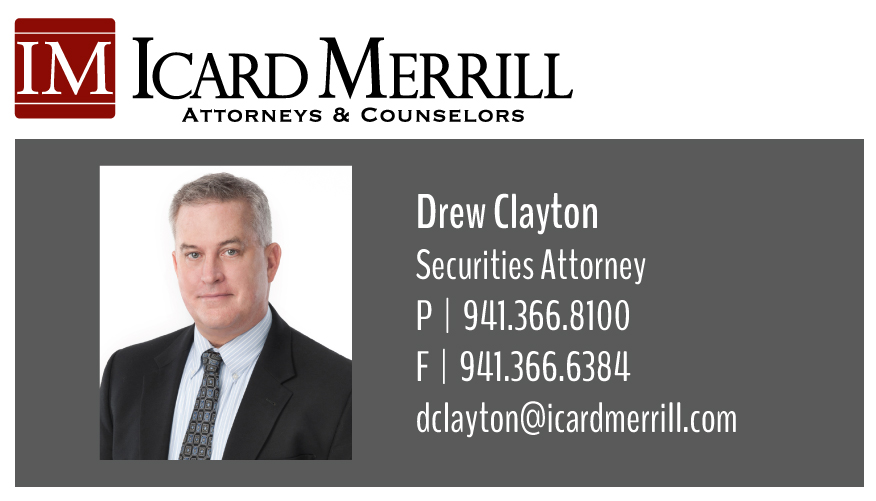
Sponsored
Analyzing Securities Cases in Good and Bad Investment Markets
by Drew Clayton, Securities Attorney
In 2008, investment portfolios sustained dramatic losses that resulted from historic and cataclysmic developments in the world’s economy now known as the “Great Financial Crisis.” These extraordinary events resulted from a variety of circumstances, including the collapse of the subprime mortgage market, the resulting credit crisis, and the demise or restructuring of some of the globe’s largest and most notable investment houses and banks.
Although several years have passed since the Great Financial Crisis and the markets have generally performed well in recent years, we continue to see mismanaged investment accounts that have exposed our clients to unnecessary risk and resulted in sometimes significant losses.
Our firm has significant experience in representing the interests of investors who have sustained losses as a result of wrongdoing by their stock brokers and investment advisors. Over the years, we have been contacted by many prospective clients who have lost significant amounts of money in the market. The purpose of this brief article is to explain the way in which we assess potential new clients’ cases. Our analysis of cases is similar, regardless of the type of investment market in which losses occurred. Nonetheless, we are always mindful that broad market trends may have the effect of either strengthening or weakening any given case depending upon the investment experience of the investor, his or her investment objectives, as well as their financial circumstances and needs.
First and foremost, it is important to note that investment losses, standing alone, do not provide a legal basis for an aggrieved investor to recover their investment losses. In order for us to determine whether a potential client has a legitimate and viable legal claim, we must know the answer to at least five fundamental questions:
- What was the investors’ investment objective(s)? For example, was the investors’ objective income, growth, preservation of capital, speculation, or some combination of those?
- Did the broker or investment advisor recommend the investments in the account(s) at issue?
- If so, were those investment recommendations consistent with the investors’ investment objective(s)?
- Could the investor afford to take the potential risk posed by those investment recommendations?
- And, if there were “unsuitable” investment recommendations, how much money has the investor lost as a result?
In order to get the answer to these questions, we need to see any account agreements and account opening documents for the brokerage account(s) at issue, as well as copies of all monthly statements covering a period of time that may span several years. We also need to review other brokerage accounts that the prospective client has had, as well as copies of the investors’ tax returns for the past several years. In addition, we need to see any correspondence between a prospective client and the broker, brokerage firm, and/or any securities regulators. We may well need to see other documents that relate to the potential claim at issue, such as prospectuses and research reports, among others.
Of course, we will interview you and other available witnesses in detail. We will not prosecute any case unless we believe, based on a comprehensive investigation, that the case is meritorious and that the costs of engaging in a formal legal proceeding are justified by the potentially recoverable damages.
In that regard, it is very important to bear in mind that even if an investor’s claim has legal merit (for example, because the investments at issue were unsuitable), the losses resulting from those investments may not be substantially worse than they would have been if the portfolio had been properly invested. In a “normal” investment climate, this type of concern would not be as significant as it is in these extraordinary times. Consequently, our analysis will also examine how an investors’ portfolio would have done over the relevant time period had it been suitably invested.
If you retain our services, the investigation we will undertake on your behalf, outlined very briefly above, will take several weeks of time. Please bear with us as we seek critical answers to the questions above in order to provide you with competent legal advice. Ask us to send free written information about our qualifications and experience.
###
 Drew Clayton is a shareholder at Icard Merrill with a practice focused on securities arbitration and litigation. Drew has been involved in hundreds of securities-related disputes during his 31-year career, and has not only represented customers in cases against financial advisors and brokerage firms, but investors in closely-held businesses, securities industry employees in disputes with their former employers, and in regulatory proceedings initiated by state and federal regulators as well as the Financial Industry Regulatory Authority.
Drew Clayton is a shareholder at Icard Merrill with a practice focused on securities arbitration and litigation. Drew has been involved in hundreds of securities-related disputes during his 31-year career, and has not only represented customers in cases against financial advisors and brokerage firms, but investors in closely-held businesses, securities industry employees in disputes with their former employers, and in regulatory proceedings initiated by state and federal regulators as well as the Financial Industry Regulatory Authority.

Sarasota Scene Magazine
1834 Main Street
Sarasota, FL 34236
941.365.1119
941.954.5067 fax
Copyright © 2021 Sarasota Scene Magazine
Sarasota Web Design and SEO by Hypercube Tech


You must be logged in to post a comment Login